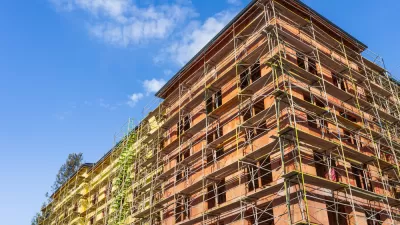There are two fundamental flaws with the emergent "YIMBY" approach to planning and development politics, according to this article in an influential magazine of the American left.
Karen Narefsky writes for the socialist publication Jacobin in an article that's generated a lot of discussion.
Narefsky's subject: a critique from the left of the movement known as YIMBY—the pro-development approach to the housing crisis afflicting many U.S. cities. After explaining YIMBYism and providing examples of YIMBY political action, Narefsky argues that the YIMBYframework has two fundamental flaws:
First, by positioning themselves as NIMBYs’ virtuous foils, YIMBYs paint all critics of development as entitled, self-interested actors who have no concern for the greater good — ignoring the fact that it is quite possible to be skeptical of a development for reasons other than personal greed.
Narefsky reminds the reader that developers are only beholden to investors, not the communities where they build. This flaw echoes a similar argument about communitarian interests written by Lisa Schweitzer in September 2016.
But the second flaw is more important to Narefsky:
The second, and more important, problem with YIMBYism is that it is based on an embrace of the speculative housing market. It assumes that the cause of the housing crisis is a dearth of supply, and that the market will address the crisis if restrictions are lifted.
Narefsky writes that land prices will never drop enough to bring the cost of housing within the reach of most working people. Moreover, the idea that today's luxury units might some day become affordable for a wide swath of the population (an idea most recently explained by Joe Cortright) ignores the reality of the contemporary real estate market: "Existing housing is more likely to be turned into short-term rentals through Airbnb, flipped to a condo developer, or turned into a high-end rental than it is to be occupied by a low-income family."
To conclude, Narefesky proposes an alternative schema to evaluate development proposals and planning visions, discarding the false choice between NIMBY and YIMBY.
FULL STORY: What’s In My Backyard?

Planetizen Federal Action Tracker
A weekly monitor of how Trump’s orders and actions are impacting planners and planning in America.

Maui's Vacation Rental Debate Turns Ugly
Verbal attacks, misinformation campaigns and fistfights plague a high-stakes debate to convert thousands of vacation rentals into long-term housing.

San Francisco Suspends Traffic Calming Amidst Record Deaths
Citing “a challenging fiscal landscape,” the city will cease the program on the heels of 42 traffic deaths, including 24 pedestrians.

Amtrak Rolls Out New Orleans to Alabama “Mardi Gras” Train
The new service will operate morning and evening departures between Mobile and New Orleans.

The Subversive Car-Free Guide to Trump's Great American Road Trip
Car-free ways to access Chicagoland’s best tourist attractions.

San Antonio and Austin are Fusing Into one Massive Megaregion
The region spanning the two central Texas cities is growing fast, posing challenges for local infrastructure and water supplies.
Urban Design for Planners 1: Software Tools
This six-course series explores essential urban design concepts using open source software and equips planners with the tools they need to participate fully in the urban design process.
Planning for Universal Design
Learn the tools for implementing Universal Design in planning regulations.
Heyer Gruel & Associates PA
JM Goldson LLC
Custer County Colorado
City of Camden Redevelopment Agency
City of Astoria
Transportation Research & Education Center (TREC) at Portland State University
Jefferson Parish Government
Camden Redevelopment Agency
City of Claremont





























